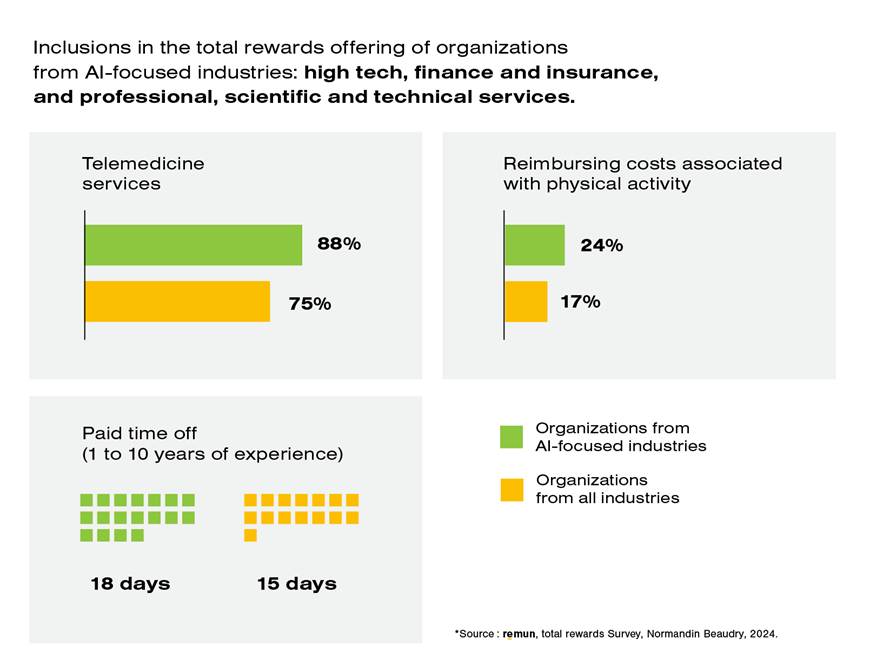As Canadian employers battle global competition for scarce AI expertise, pay isn't the only thing on the rise

This article is produced in partnership with Normandin Beaudry
Investments in artificial intelligence (AI) are reaching unprecedented levels, likely to surpass those made in any other technological advancements made in the history of modern industry.[1] Governments, corporations, and investors worldwide—including those in Canada—are pouring funds into AI, recognizing its transformative potential. This influx of capital is reshaping the job market, driving up salaries, and redefining total rewards strategies.
Canada’s Strategy for AI Talent
Faced with rapid AI adoption, Canadian stakeholders are taking a proactive approach to remain competitive in the global talent race, investing heavily in relevant education and training through establishments like the Mila Institute in Montreal and the Vector Institute in Toronto. Simultaneously, Canada is working to strengthen its expertise in AI security and ethics, positioning itself as a leader in responsible development of the industry.
However, as demand for AI expertise surges, many Canadian professionals with highly sought-after skills are increasingly working remotely for global firms. This shift puts pressure on local employers to rethink their approach to compensation. Competitive salaries alone are no longer adequate; organizations must offer compelling total rewards packages that include benefits, flexibility, and long-term career opportunities.
AI Specialist Scarcity
The demand for AI talent far outpaces supply, a trend that mirrors past technological shifts. Similar patterns have played out in industries like cybersecurity, where analysts in finance and tech saw major salary increases after 2020 due to heightened security risks tied to remote work. Likewise, the video game and special effects industries saw dramatic wage increases two decades ago as the need for specialized talent outstripped the available workforce. AI is now experiencing this same phenomenon, with salaries climbing as organizations across multiple industries compete for a limited talent pool.
AI Talent Concentration
According to Normandin Beaudry, these professionals are primarily found in AI-specialized organizations as well as three key industry categories:
- High-tech
- Finance and insurance
- Professional, scientific, and technical services
While precise figures are still being determined, early data suggests that most AI talent is concentrated within these industries.
Salary Trends: A Growing Premium for AI Roles
AI professionals are commanding significant salary premiums. Data from Normandin Beaudry’s compensation survey, remun, shows that salaries for AI roles in these organizations are, on average, 30% higher than comparable roles in other industries. Even in non-AI-focused industries, employees with relevant AI expertise earn 15-20% more than their counterparts in similar positions.
Across industries, AI salaries consistently outpace both IT and non-IT roles. While IT professionals generally earn 5-10% more than non-IT employees, their earnings still fall short of AI salaries, reinforcing the high value placed on this area of expertise in today’s job market.
Beyond Salary: The Total Rewards Picture
To attract and retain AI talent, organizations are offering more than just competitive salaries. Compensation strategies in leading industries—such as high-tech, finance and insurance, and professional, scientific and technical services—transcend pay to include enhanced benefits, work-life balance initiatives, and other incentives.
The 2024 remun survey edition also found that these organizations are investing in employee engagement, with 36% conducting frequent pulse surveys—well above the 23% average seen across all industries.
Work-life balance is another key factor in compensation strategies for AI roles. More than 80% of organizations in AI-focused industries competing for AI talent emphasize work-life balance in their employee value propositions, significantly higher than the cross-industry average of 69%. Additionally, 88% provide telemedicine services, compared to 75% across all industries. Some organizations are even reimbursing costs associated with physical activity, a benefit offered by 24% of organizations in these industries versus 17% across all industries.

Paid time off is another area where AI-focused industries stand out. Early-career employees (with one to ten years of experience) receive an average of 18 vacation days, compared to 15 days across all industries. Furthermore, 70% of these organizations recognize prior work experience in vacation allotments, making them more attractive to experienced professionals.
Health insurance and retirement benefits are also more robust in AI-driven industries. In finance and insurance, 78% of organizations offer flexible benefits plans, more than double the 36% average across all industries. Additionally, 72% provide health spending accounts, far exceeding the 42% across all other industries. Meanwhile, high-tech employers contribute an average of 4.4% of salary to retirement plans versus the all-industry average of 4% which represents a 10% gap in employer contributions in this industry.
Hiring Trends: The Growing Demand for AI Talent
As organizations increasingly integrate AI into their operations, demand for these roles continues to grow. This trend is expected to persist as organizations seek to expand their AI capabilities, but businesses outside the AI sector may struggle to compete for top talent, especially if compensation gaps widen. Additionally, as AI adoption spreads, upward pressure on salaries and total rewards could extend beyond AI-heavy industries, impacting the broader labour market.
Given the ongoing talent shortage, these challenges are unlikely to subside anytime soon. Employers must strike a careful balance—offering attractive compensation packages while ensuring that long-term costs remain sustainable.
Strategic Agility: The Key to Long-Term Success
Organizations that hope to remain competitive in an AI-driven talent market must be agile in their approach to compensation. In the short term, adjusting salary structures, enhancing benefits, or introducing new incentives may be required to attract top AI professionals. However, long-term success will depend on more than just monetary rewards. Organizations that invest in career development, foster a strong workplace culture, and provide meaningful work opportunities will be better positioned to retain AI talent. AI’s impact on the job market and compensation is still unfolding, but it’s increasingly clear that organizations failing to adapt to these changing dynamics risk being left behind.
[1] 2024 Midyear Global Outlook, Waves of transformation, BlackRock Investment Institute, 2024.



